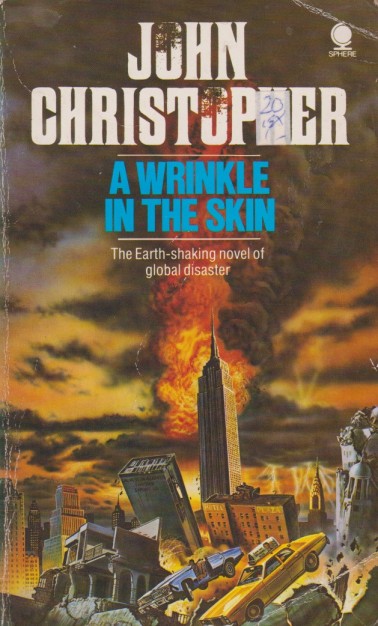A Wrinkle in the Skin by John Christopher (1965) 220 p.

(This is a very satisfyingly bad cover – the book takes place in England and the Channel Isles and has nothing to do with America. Bizarrely, this is from a British edition.)
A series of unprecedented earthquakes wreaks havoc across the globe, laying waste to Western Europe and leaving protagonist Matthew Cotter as one of the few survivors on the island of Guernsey, having fortuitously been outside in the middle of the night when the quake collapsed most structures. The earthquake has dramatically changed the landscape and drained the English Channel, and Matthew eventually resolves to trek north across the dry seabed to try to find his daughter in England.
It’s an original conceit for an apocalyptic novel, but unfortunately suffers from being written by somebody who had perhaps at this point in his career written too many of them. Literally the first day after the disaster, Matthew has accepted that this is truly the end of civilisation and is speculating about how things will unfold for the survivors not just in the days and weeks ahead, but the years and generations; I’m sure a writer of post-apocalyptic fiction would do that, but probably not a Guernsey horticulturalist. It’s also only a few days before the other Guernsey survivors are descending into caveman rule, asserting which men “own” which women and so on, and when Matthew gets to the mainland he finds it’s collapsed into brutal anarchy with survivors killing and raping and plundering with abandon, when there’s not even any real scarcity or competition for resources yet. (The vast majority of people are dead; tinned food lies in every ruin for the taking.) This is in stark contrast to Christopher’s earlier novel The Death of Grass, which illustrates how civility and peacefulness can crumble quite quickly when there are suddenly too many mouths and not enough food, i.e. when there is a material reason for them to do so. In A Wrinkle in the Skin it just seems silly.
The Death of Grass is also the superior novel for demonstrating, unlike much post-apocalyptic fiction, that most people would be quite willing to hurt others to save themselves and their children; it does so by having the main characters violently attack and kill an innocent family to take their food, flipping the usual cliche of “good people” and “bad people” that you see even in acclaimed post-apocalyptic fiction like The Road. A Wrinkle in the Skin, on the other hand, hews more closely to Christopher’s curiously English outlook I identified in The World in Winter: his conceit (laid out here explicitly, at one point) that in the event of a disaster like this, the middle class would be a steady, civilised hand on the tiller while the working class, if left to themselves, would descend into a violent, anarchic rabble, referred to here as “oiks” or “yobbos.”
It’s a fairly offensive stance, though difficult to tell how much of it is subconscious and how much Christopher would have held to it if anybody had ever challenged him on it. Maybe it was also present in his better novels like The Death of Grass, and I unwittingly passed over it; I read them when I was much younger and before I’d lived in England and realised how pervasive their class structure is even in the 21st century, let alone Christopher’s day. I don’t have any illusions about whether peaceful civilisation could endure an event like this, but I don’t believe that it would disintegrate that quickly, and I certainly don’t believe it would fragment along class lines – that’s a ridiculous English fantasy. (And this is all without touching on the book’s sexism which at times becomes outright misogyny, puzzlingly uncharacteristic of Christopher.)
It’s still a decent book for all that. I try not to judge writers too harshly for being a product of their age, and it really only stuck out here for me because it’s by far the most explicit presentation of Christopher’s class prejudice I’ve yet read. There are some great set-pieces, particularly the trek across the dried-out seabed of the English Channel, and the half-mad Greek captain living in his luxurious beached tanker. There’s an interesting dynamic that develops between Matthew and the young boy he rescues and takes under his wing, with the former feeling a constant guilt for endangering the kid by dragging him across England looking for his own daughter. A Wrinkle in the Skin is a good read; just take Christopher’s prognostications about how the post-apocalyptic chips might fall with a pinch of salt.

1 comment
Comments feed for this article
October 18, 2020 at 9:26 am
Calmgrove
An enlightening review, thank you. Having just read The White Mountains (and looking forward to The Death of Grass) I took the implicit class distinctions of 1960s Britain, still evident in 2020 as you point out, and projected here into the late 21st century, well within my stride. Pretty much all post-apocalyptic / dystopian novel can’t help reflecting the age in which they were written, but some are less obvious about it than others. I’ll certainly bear your caveats in mind if and when I eventually get round to this title!